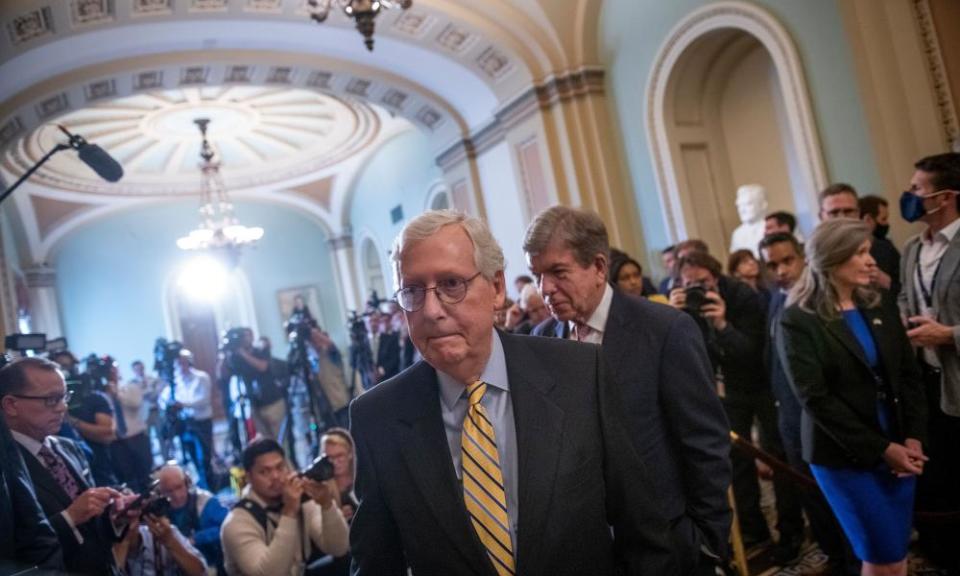Democrats seek way forward after voting rights bill hits Senate roadblock

- Oops!Something went wrong.Please try again later.
- Oops!Something went wrong.Please try again later.
- Oops!Something went wrong.Please try again later.
After nearly six months of watching Republicans relentlessly make it harder to vote in the US, Democrats suffered a major blow on Tuesday after GOP senators used a legislative maneuver to halt a sweeping voting rights and ethics bill.
The vote doesn’t kill the bill, but it marks one of the most significant setbacks for Democrats in Joe Biden’s presidency so far. Democrats heralded the legislation as their No 1 priority, even knowing they were unlikely to get any Republican votes for it. The bill would amount to the most significant expansion of the right to vote in a generation, requiring early voting and automatic and same-day registration, while prohibiting excessive manipulation of electoral district boundaries, a process often called gerrymandering.
It wasn’t an unexpected result. Democrats control only 50 seats in the Senate and a procedural rule, the filibuster, blocks most legislation from proceeding to a full debate on the floor unless it has 60 votes. A handful of Democratic senators, most notably Joe Manchin of West Virginia and Kyrsten Sinema of Arizona, support keeping the filibuster in place, saying it helps ensure the minority party has a say. But while the rule remains, Democrats have virtually no chance of passing sweeping voting rights legislation.
Democratic senators are now in a quagmire amid escalating concerns that Democrats, who control both Congress and the White House, might not be able to use their power to stop what many experts see as openly anti-democratic efforts by Republicans across the country to make it harder to vote after an election in which there was record turnout, including surges among Black, Asian American and Hispanic voters.
Republicans have used partisan majorities in statehouses across the US to pass these measures, even as they have accused Democrats of acting with partisan intent to pass voting reforms.

Raphael Warnock, a Democratic senator from Georgia, harshly criticized Republican colleagues for refusing to even allow a vote on the bill on the Senate floor.
“Surely, some of my Republican friends believe – at the very least – that in this chamber, we should be able to debate about voting rights,” he said. “Voting rights are preservative of all other rights. And what could be more hypocritical and cynical than invoking minority rights in the Senate as a pretext for preventing debate about how to preserve minority rights in the society?”
Tuesday’s vote on whether to allow debate on the bill was widely seen as a maneuver to pressure Republicans into taking a public stance on the bill and to pressure moderate Democrats, including Manchin and Sinema, to take a position.
In a statement a few hours before the vote, the White House offered a blunt assessment of the attack on voting rights across the United States. “Democracy is in peril,” it said, urging senators to support the bill.
“This kicks off the next phase of the fight,” said Tiffany Muller, the president of End Citizens United and Let America Vote, a group running a $30m campaign in support of the bill. “If I had a nickel for every time someone wrote ‘this bill was dead’, I would have enough to fund the entire campaign. People have been counting this bill and these efforts out for the entire year, and not really seeing what was happening across the country.”
Related: Landmark voting rights bill defeated in Senate despite Democratic unity
Nsé Ufot, CEO of the New Georgia Project, a Georgia-based group that has worked for years to mobilize voters in the state, called on the White House to increase its efforts to pressure senators who opposed the bill.
“Where is the fight?” she said. “I understand that the upper house, the upper chamber, there’s a focus on collegiality … [but] collegiality at the expense of actually getting stuff done, collegiality at the expense of preserving Americans’ ability to participate in our elections, seems misguided.”
It’s not clear what the path forward might look like. Last week, Manchin released a compromise that maintained some of the most important provisions in the bill – including making election day a federal holiday, requiring two weeks of early voting, allowing automatic registration at motor vehicle offices, and mandating that states give voters seven days’ notice of a polling place change. However, the proposal does include a voter ID requirement, allowing for more aggressive voter purging, and does not require states to create independent redistricting commissions, which reformers see as a gold standard in curbing excessive gerrymandering.
Manchin wound up voting with Democrats on Tuesday to move to advance the bill, an encouraging sign to bill supporters that further highlights Republican obstructionism.
“These reasonable changes have moved the bill forward and to a place worthy of debate on the Senate floor,” Manchin said in a statement. “Unfortunately, my Republican colleagues refused to allow debate of this legislation despite the reasonable changes made to focus this bill on the core issues facing our democracy.”

Republicans appear unlikely to come around on Manchin’s compromise bill. And while Barack Obama endorsed the compromise on Monday, more than 20 civil rights groups, including the NAACP Legal Defense Fund and Black Voters Matter, said the proposal was inadequate.
“Senator Manchin’s compromise fails to adequately address the more than 400 voter suppression measures that are being introduced across the country,” they wrote in a joint statement. “Most damaging is its neglect of protections for formerly incarcerated and justice impacted voters; voters with disabilities; Black and all multi-marginalized voters. There has been no indication from Senator Manchin’s reported conversations with conservatives that he has been able to secure Republican support for any of the core elements of [the legislation] which is disappointing to the many activists who are pushing for passage of the bill.”
Senate Democrats plan to hold a series of field hearings on voting rights in Georgia and elsewhere in the coming months to continue to highlight voter suppression. Biden also pledged more action on Tuesday evening.
“This fight is far from over – far from over. I’ve been engaged in this work my whole career, and we are going to be ramping up our efforts to overcome again – for the people, for our very democracy,” he said in a statement.
It’s also not clear how Democrats plan to get around the filibuster. Manchin has been steadfast in his commitment to the rule, though privately he has left the door open to lowering the threshold of votes needed to overcome a filibuster. Sinema, another staunch supporter of the filibuster, also authored an op-ed in the Washington Post on Monday evening saying she was committed to keeping the procedure in place.
Muller pointed to the Senate’s August recess as a deadline to pass a bill, when many states are set to begin drawing electoral districts for the next decade. Republicans control the redistricting process in many states and without the anti-gerrymandering provisions of the bill in place, lawmakers would be free to manipulate districts to give them a significant advantage in elections.
“We are literally seeing this very direct undermining of our democracy. And if that goes unchecked, I am very concerned about the future of our democracy,” she said.
Nearly 500 state lawmakers wrote to Senate leadership on Tuesday begging them to pass the sweeping bill.
“We have attempted again and again to work with our Republican colleagues to set policies that safely and securely expanded voting access – but they simply refuse to act in good faith,” they wrote. “We are out of options. We need your help.”

